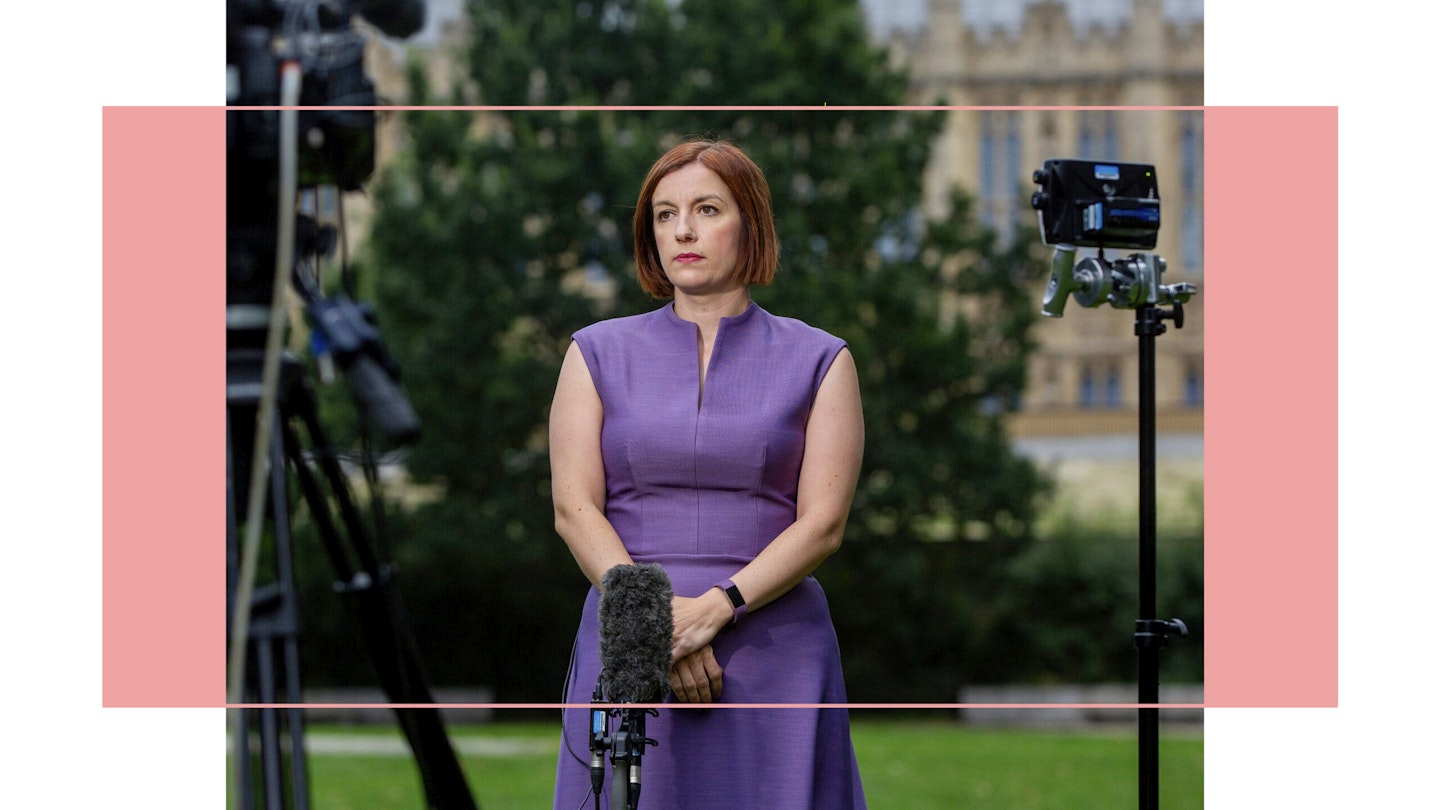When Shadow Education Secretary Bridget Phillipson was a little girl, she sometimes went to bed fully dressed. With no heating upstairs and draughty, rotten windows, it helped her stay warm. Her mother was a single parent, unable to work for lack of childcare, so money was tight; only when Phillipson started school could her mother get the job that eventually helped her buy their council house – and fix the windows.
Phillipson knows, in short, why childcare matters, as does being able to buy your own home. They’re worryingly distant dreams for many now, but they’re looking increasingly central to Labour’s 2024 election campaign.
Speaking exclusively to Grazia from the party’s annual conference in Liverpool, she nods immediately at the mention of Grazia x Pregnant Then Screwed’s campaign for a review of childcare funding. She’s just asked veteran ex-Whitehall official Sir David Bell to lead a review of early years, covering everything from the ‘chronic shortage’ of places to the frustrations driving nursery workers to quit. ‘If we win the next election I want us to be ready to make changes from day one,’ she says, revealing that she’s asked for ideas by the end of 2024. Sir David will explore options including setting up new nursery classes attached to primary schools, and there will be new powers for councils to create childcare places.
With the childcare crisis sadly pushing some parents to consider giving up work, Phillipson says fixing things would be ‘top priority’. ‘The number of women in particular (sadly, it does tend to fall to women) who are giving up jobs they love or cutting back their hours because they just can’t get the childcare or it doesn’t work for their families, that has a massive impact on the individual but alongside that it damages life chances for families too.’ She worries about the clock being turned back. ‘We’re in a really crucial moment in the economy, particularly for women, where we’ve made such tremendous progress and I’m deeply concerned that it risks being undone.’
But early years isn’t just about helping parents work, she cautions; it’s also about preparing children for school and narrowing the gap between richer and poorer families. What’s still unclear is quite what this means for parents struggling with nursery bills. The Conservative Chancellor Jeremy Hunt recently swiped what many thought would be Labour’s big idea, promising30 hours’ free childcare a week for all preschoolers aged over nine months by 2025. But with providers warning that the money on offer isn’t enough to make that a reality, Phillipson says parents risk feeling ‘very badly let down’ without a solid plan to deliver it.
Though she calls the free hours model ‘broken’, she won’t say exactly how Labour would mend it beyond suggesting they’d spend the money Hunt has pledged differently. ‘I don’t believe just pouring money into an already broken system is going to deliver for parents – I’m interested in making better use of the money.’ Her review is likely to be seen as a way of building the future case for more money – though she stresses that Shadow Chancellor Rachel Reeves is ‘incredibly passionate’ about childcare.
Keir Starmer’s plea last week not to crush working-class children’s ambitions resonated personally with Phillipson, who went from a comprehensive near Sunderland to Oxford University. She worries about Rishi Sunak’s recent attack on supposedly ‘low value degrees’ leaving kids in communities like hers thinking university isn’t for them, and about students juggling bar jobs alongside degrees because their loans don’t cover the rent. So would she consider reintroducing maintenance grants?
‘The Government knows it’s not working, we know it’s not working, the Tories are happy to kick the can down the road. We will have to grapple with this if we win the election,’ she says. ‘My starting point would be to reform the existing system to make it fairer for students.’ Students should be able to pick the course that works for them, she argues, not feel forced to live at home because they can’t afford to move away.
Privately branded ‘chippy’ by the Independent Schools Council, with whom she’s tussled over plans to put VAT on private school fees and spend the money on state schools, Phillipson has now adopted the word as a badge of honour. ‘Chippy is a rather old-fashioned, snobby kind of word but I’ll take it if it means delivering better for working-class children,’ she says. Her life may be very different now – she’s married to Lawrence, who works in financial services, and has children aged seven and 11 – but she remains fiercely proud of her roots.
It was her mother, a ‘force of nature’ who left school at 15 and ended up founding a charity for domestic violence survivors, who sparked her political interest by taking the young Phillipson to Labour Party meetings when she couldn’t get a babysitter. Phillipson never met her father – ‘he disappeared off the scene when my mam was pregnant and made no contribution to us financially’ – but says her mother and grandparents ensured she never felt something was missing. ‘I had a very loving family and it’s about valuing what you have, not yearning for what might have been.’ By 26 she was already an MP; now 39, she’s tipped as a future possible leader.
For now, any restless ambition is confined to playing hockey, a sport she has recently resumed. ‘It’s a tough old game and it allows me to indulge my very competitive streak,’ she grins. It’s clear Phillipson plays to win.
